


Keywords: public interest; transition; political power
More...Keywords: Evropski sud; nadležnost; trgovinske stvari.
Nadležnost evropskog suda ima izvjesne specifičnosti u odnosu na redovne sudove, jer su nadležnosti Evropskog suda kao institucije ograničene. U ovom radu su predstavljeni sledeći postupci: Prethodni postupak, postupak koji pred Sudom pokreće nacionalni sud pred kojim se neko pitanje evropskog prava pojavi kao relevantno za odlučivanje u predmetu.
More...
Keywords: justice; transition; nationalism
More...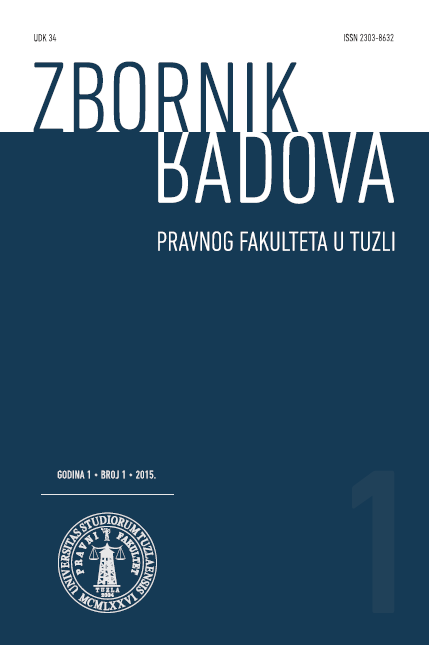
Keywords: consumer; distance contract; e-contract; Directive 97/7/ EC; Directive 2011/83/EU
Basic characteristic of a distance contract is the physical absence of the parties, using a means of distance communication, today the main place undoubtedly belongs to the Internet, occurs the entire contractual process, including sometimes fulfillment. Distance contracts have been the subject of regulation of Directive 97/7/EC, but in the new millennium the business environment has changed radically by introducing modern technology, new tools like web, email, mobile pushed the traditional one like phone, fax, catalog, telemarketing and etc., and due to its mass acceptance synonymous for distance sales became online sales. Progressive digital environment has opened up a number of issues that needed adequate normative response as consumers have become more vulnerable to traditional risks in a new and different way, and in this regard the Council Directive 2011/83/EU has been adopted. Besides the new directive improve existing rights, it also imposed the traders some additional requirements when entering into e-contracts with consumers. This paper aims to present certain aspects of the legal position of consumers who enter into contracts using the means of distance communication, with special emphasis on Internet contracts, and will try to answer the question what is the status of consumers under the B&H regulations in order to point to future changes.
More...Keywords: notary form; notarial proceedings; contracts which will have effect within the inheritance law
By introducing the Notary Law in the legal framework of Montenegro, the notary form has been imposed as a mandatory condition for contract validity which will have inheritance effect (Contract for passing and distribution of the property amongst spouse and lineal descendants, Contract for life-long maintenance). All above comes from the fact that these specific contracts create complex relations and their conclusion can have tremendous consequences for contractual parties. The goal was to provide a high degree of legal protection for the parties in the national legislation. Subject of this work was regulation of contracts arising from inheritance law, participation of Notary in creating such regulations and regulation of Montenegrin legislator. Montenegrin legislator regulated these issues within the Law of Obligation and Law on Notaries in a way that some provisions which address the same issue regarding the notary form are different. All of this is unacceptable, having in mind the legal and political goal of the notary form as a mandatory condition for the validity of the contract and also renouncement of the consensually principle. More precisely, Montenegrin legislator made more complex the already specific contracts which have effect within the inheritance law.
More...
Keywords: Yugoslavia; NATO bombings; Milošević regime; Albanians;
Jugoslavija je danas mesto patnje. Zemlja je pretvorena u pozornicu na kojoj se dva takmičara utrkuju do "moralne pobede". Pozornica je bedna, a trkači — zapadna vojna alijansa i Milošvićev režim — ostavljaju utisak tek trećerazrednih amatera. Samo je cena ostvarenja proklamovanog cilja ekstremno visoka: ubijanje jednih nevinih, proterivanje drugih nevinih, razaranje zemlje. Milosevic spremno koristi najsurovija sredstva protiv albanskih civila na Kosovu, pozivajući se na "naše moralno pravo" da branimo zemlju od agresije. NATO čini isto, sa tek promenjenim predznakom: "mi" imamo moralnu dužnost da šitimo nevino alban - sko stanovnišvo Jugoslavije, pa otuda sledi "naš moralno pravo" da bombardujemo nevino nealbansko stanovništvo Jugoslavije. [...]
More...![Contract between salvor and a third party in connection to a salvage operation, and the issue of duress : [case review]](/api/image/getissuecoverimage?id=picture_2014_44245.jpg)
Keywords: case review; salvage at sea; salvage contract; third person; duress;
[topics:] BIMCO Supplytime Charterparty – Salvage – Contracting under Duress – Terms and Conditions of Contract Inequitable and Exorbitant – Payment in an Excessive Degree too Large– 1989 International Salvage Convention’s Scope of Application – Definition of Salvage Contracts– Inter-relationship between Salvage Contracts and Third Party Contracts entered into by Salvor – Relationship between Owner and Charter party
More...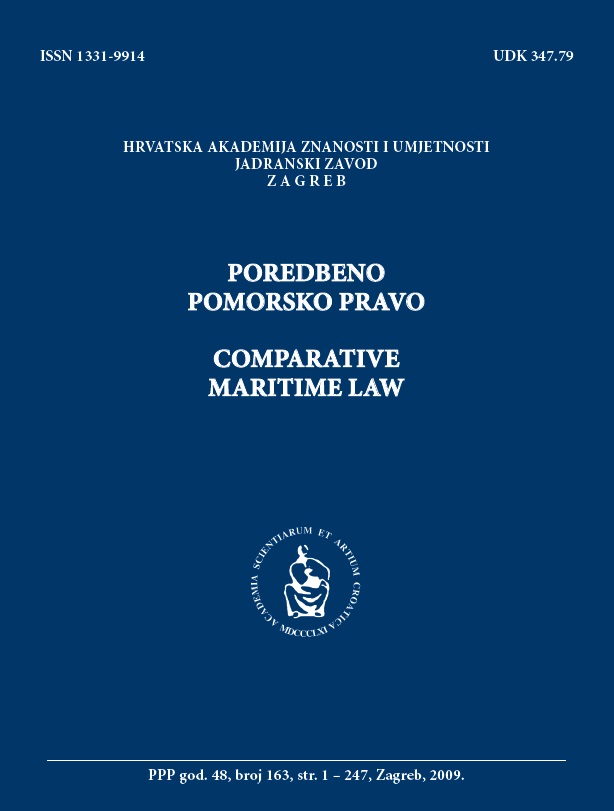
Keywords: concession; concession agreement; pledge; pledgee; maritime domain; banks; enforcement; assignment
It is unlikely that banks will ever use the proposed form of security – a pledge over concession rights. Pursuant to the Properties Act, any provisions of the pledge agreement contrary to the principles of pledge, and particularly the provision pursuant to which the pledged property shall, in the event of default, become the pledgee’s property, shall be null and void. The Properties Act gives to the pledgee right to enforce its claim through the court, or through out-of-court sale, and not through de-possession or use of the pledged property. Pursuant to Article 34 of the Maritime Domain and Seaports Act the concession shall be withdrawn if the pledgee (such as bank) does not meet the conditions applicable to the concessionaire and does not obtain the approval from the authorities. Thereby, it seems, banks are excluded automatically from potentially becoming pledgees over the concession rights. As security banks will normally take assignment of the concessionaire’s rights and benefits under the concession agreement and pledge of shares in the concessionaire. In the event of default the bank will through out-of-court settlement transfer the shares to a new investor in order to secure the performance of the concession and repayment of debt.
More...![Pomorsko imovinsko pravo [= Maritime Proprietary Law] (author D Pavic)(Split, 2006) : [book review]](/api/image/getissuecoverimage?id=picture_2007_45607.jpg)
Keywords: book review; maritime proprietary law;
Drago Pavić, POMORSKO IMOVINSKO PRAVO, Split, 2006., 621 str. Izdavač: Književni krug
More...![Termination of employment of the seaman on account of sale of the ship : [case review]](/api/image/getissuecoverimage?id=picture_2006_45792.jpg)
Keywords: case review; seamen - termination of employment; sale of ship;
At the employer's decision, employment of the seamen on board the ship of the employer may terminate on account of sale of the ship.
More...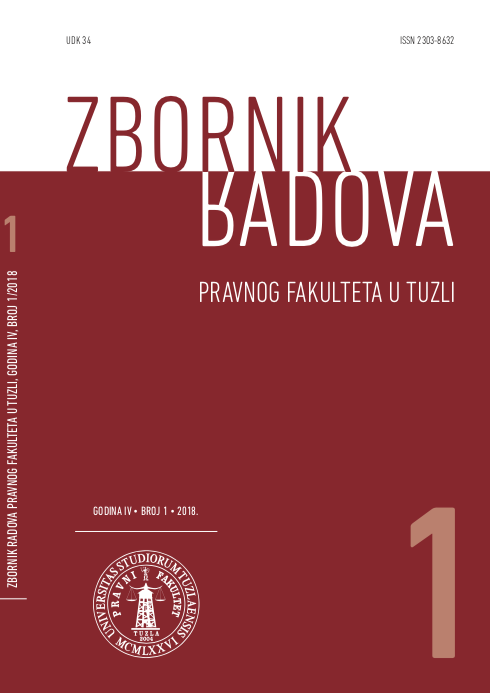
Keywords: consumer protection; unfair business practices; case law; economic services;
The European Union in the seventies of the twentieth century recognized the importance of satisfied customers and secure in the function of the internal market, and later built up an impressive body of knowledge, norms and practices of its authority in the field of consumer protection. In 2015, the total GDP of the EU amounted to 16,311.90 billion US dollars, while the final consumption accounted for 56%, or a total of 9,134.66 billion. Therefore, the European Union, the adoption of Directive 2005/29 / EC on unfair business practices, unambiguously stipulated that the unfair commercial practices towards consumers prohibited. As Bosnia and Herzegovina aspires to membership in the European Union, discussed the results achieved in the field of protection of consumers from unfair business practices in Bosnia and Herzegovina, through the analysis of the normative framework of consumer protection, the protection level, consumer protection entities and their practices. Significant and very lively communication with consumers Consumer Protection Association, represents a kind of a survey on the situation of consumers in Bosnia and Herzegovina. Analysis of judicial practice in the Federation BiH, indicates how courts apply the standards in force in the field of consumer protection.
More...![Pomorsko pravo. Knjiga druga : Pravo pomorskih prijevoza [=Maritime law. Book 2: Law of the carriage by sea] (author D. Pavic) (Split, 2002.) : [book review]](/api/image/getissuecoverimage?id=picture_2003_46541.jpg)
Keywords: book review; maritime law; carriage by sea - contracts;
Review of: Pomorsko pravo. Knjiga druga : Pravo pomorskih prijevoza (autor: D. Pavić) (Split, Visoka pomorska škola, 2002.)
More...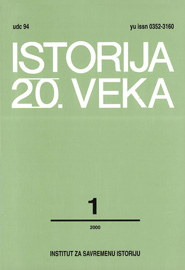
Keywords: Kingdom of Yugoslavia; minorities; Paris peace conference; nationality;
The question of the minorities' option has previously drawn little attention in Yugoslav historiography and social sciences. This question, which appeared in Serbia and Montenegro already in the 19th century, then primarily regarding Muslims, still remains to be studied. The Paris Peace Conference (1919-1920) lent particular attention, unprecedented in European history, to the protection of minority rights. This problem included the option for members of minorities to choose their nationality. Every peace agreement signed at the Conference in Paris contained articles stipulating this option for those belonging to ethnic, racial, language, or religious minorities. The peace agreements signed at Versailles already determined the right of minorities to this option. At the time this right did not pertain to minorities in the Kingdom of the Serbs, Croats, and Slovenes, but these agreements served as a model for the essential elements of this option in all the peace agreements subsequently signed with Austria, Bulgaria, Hungary, and Turkey. The option offered the possibility for members of minorities to freely choose, within a set period of time, their nationality and to transfer their domicile to the country where the nationality of their choice presented the majority. The decision to acknowledge the right of persons to the chosen nationality depended in some countries with which a peace agreement was signed on rights based on origin, and in others on rights based on domicile. The time limit for making the choice of nationality varied in peace agreements, going from six months to two years, while the term for transferring domicile to the country of choice varied between six and twelve months. Despite their efforts, the representatives of the Kingdom of the Serbs, Croats, and Slovenes, and particularly the delegation representing the Kingdom at the Conference in Paris, had little influence on the final formulation of the articles regarding this option in the peace agreements and the agreement on the protection of minority rights signed at the time. The option pertaining to the Kingdom of the Serbs, Croats, and Slovenes was entered in the Convent on Minorities and the peace agreements signed with Austria (in Saint-Germain-en-Laye, on 10 September, 1919), Bulgaria (in Neuilly-sur-Seine, on 27 November, 1919), and Hungary (in Trianon, on 4 June, 1920), but did not form part of the peace agreement signed with Turkey (in Sevres, on 10 August, 1920). The implementation of'these minority rights guaranteed by the peace agreements signed at the Paris Peace Conference proved to be of crucial importance to the members of Yugoslav, and especially Serbian, minority groups in neighboring countries.
More...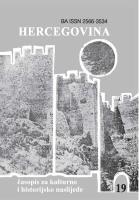
Keywords: Mostar;Hotel Ruža;
This essay aims to elucidate how political paradigm transitions affect trends in architecture and urbanization. For this purpose, the Foucault term heterotopias are used as the notion that reflects architectural and constructed objects as not merely being places of living, but also the status and power symbols of certain individuals and the ruling oligarchy. To illustrate our premise, we used a devastated, organically constructed, socialistic Hotel Ruža, located in the old town city center, which was later, during the postwar reconstruction, turned into a modern building. Today, this newly reconstructed hotel aims to show the guests’ affiliation to a specific social class and create the simulacrum that Mostar is an urbanized and modern city that possesses traditional elements interposed with contemporary urbanistic constructs. However, at the same time, this modern building’s construction serves to create a feeling or an illusion that the country is approaching western, developed urban spaces, while the reality is very different.
More...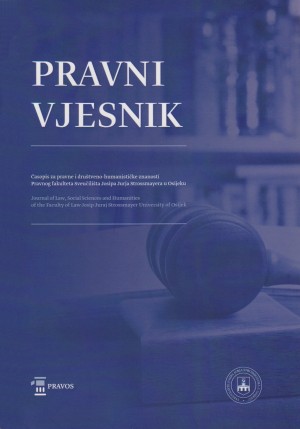
Keywords: arbitration; methods for assessing damages;
International investment arbitration as an alternative dispute resolution mechanism for resolving disputes between foreign investors and host states is also a favourite dispute resolution for investors. It consist of three parts, all of which can be resolved separately. These are jurisdiction, merits and damages. Consequently, it is possible for a tribunal to render one, two or even three arbitral awards, depending on the tribunal decision to bifurcate/trifurcate the proceedings or not. This shows the complexity of each of the stages of the arbitration proceeding. The paper deals with the issue of reparation, specifically compensation for damage caused as the main form of reparation for damage. It gives an overview of the legal issues affecting the amount of awarded damages, the main methods for calculating damages, as well as the applicable case-law and statistics in relation to the legal issues and calculating methods. The paper argues that only a proactive and inclusive approach in respect to determining damages including a detailed fact analysis for legal qualification of the dispute and determination of the best damages assessment methods, can give satisfactory results.
More...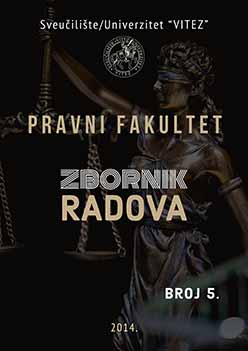
Keywords: corruption; privatization; transition; bribe; bribery; anticorruption regulations; anticorruption bodies;
Corruption is a universal social phenomenon, because it is present in all countries, in all systems and all states are working to prevent and control it. Corruption still remains the biggest obstacle to the efficient functioning of a modern state. In the Republic of Serbia, corruption is not only present in all spheres of social life, it is also very widespread, that why it is among the countries with high level of corruption. They are very numerous and diverse etiological and phenomenological aspects of its manifestation. Privatization of state-owned companies in Serbia after the year 2000th has contributed to the expansion of specific instances of corruption. They came to the fore a number of negative effects of privatization, which will in this paper be discussed.
More...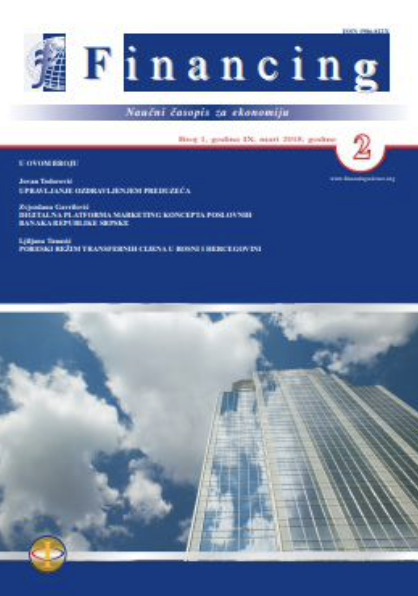
Keywords: contract; electronic contract; online market place; entity of Republic of Srpska; Act on electronic business Republic of Srpska; Act on electronic Signature; Act on Trade;
Contracts have become so common in daily life that most of the time we do not even realize that we have entered one. For traditional contracts, there are some required elements for validity, such as an agreement, consideration, contractual capacity and lawful object. In the modern fast life, it is not possible anymore to limit a business only to traditional contracts, which means to a piece of paper signed between contractual parties by hand. If we look at the past decade, we need to bear in mind that new way of communication made new types of electronic agreements necessary. It is quite true that today it is possible to complete a whole transaction in seconds, with both parties simply affixing their digital signatures to an electronic copy of the contract. In terms of the increasing use of electronic contracts, as a much faster way of doing business, it became necessary to introduce a legal regulation on it. Surely, between traditional contracts and electronic contracts there is one main difference; electronic contracts must be concluded electronically and there is no hard copy of the contract or papers nor signatures made by hand. Thanks to the existence of a legal framework of electronic contracts, there is no doubt that electronic contracts are as legally enforceable and valid as traditional contracts. This work considers general rules on electronic contracting (e-contracting) and proposes an interpretation on how the Republic of Srpska regulate electronic contracting or attempt to regulate electronic contracting.
More...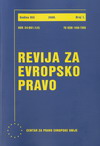
Keywords: European Union; institutional reforms; Amsterdam Treaty on the EU; Intergovernmental conference; European parliament; democratic deficit
This paper deals with the institutional aspects of the European Union’ s reform done in revised Treaty on EU (Amsterdam) that came into force on 1st May 1999. The objectives of the institutional reform of the Union are analyzed. The amendments made in new Amsterdam Treaty in relation to the Council are compared to the relevant proposals for Council' s reform. The amendments regarding the other main EU institutions are also evaluated. The special significance is given to the problem of democratic deficit of the Union and to the role of the European Parliament. The conclusion point to the evolutionary features of the Union' s institutional reforms considering that there is enough room left for future institutional improvements.
More...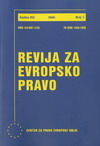
Keywords: European Community; European Union; Member States; international public law; legal personality; supranationalism
The paper is an attempt to answer the question that, in the framework of European integration, possesses the international legal personality: European Communities or/and European Union. Using the international public law's test for personality of international organizations - member states, founding treaty, permanent institutions, defined field of operation and special status - the author reaches conclusion that European Communities - each of them - are those who still possess international legal personality. As far as European Union is concerned, it signifies legal independence and operational unity of European Communities and their connection with fields of cooperation.
More...